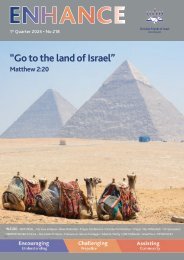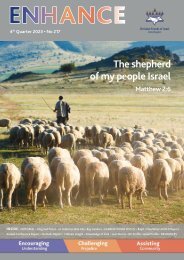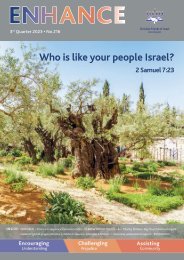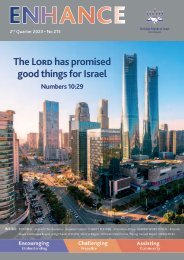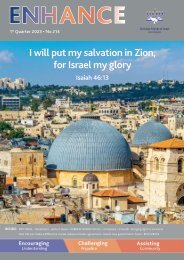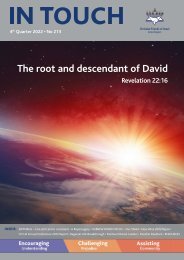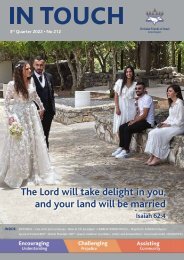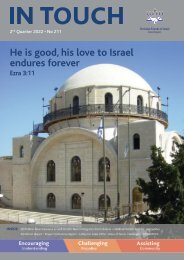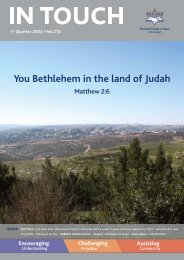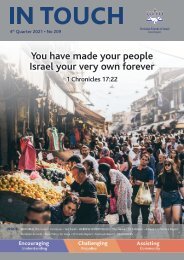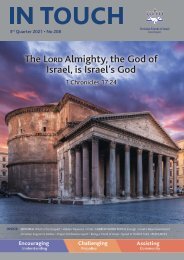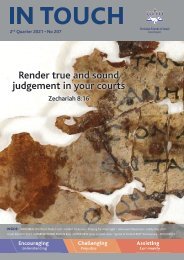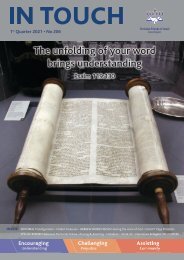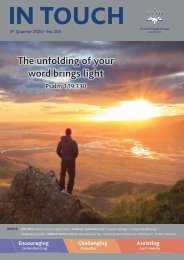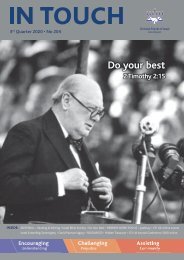Create successful ePaper yourself
Turn your PDF publications into a flip-book with our unique Google optimized e-Paper software.
Christian Friends of Israel<br />
IN TOUCH No.172 3rd <strong>Quarter</strong> <strong>2012</strong><br />
You, our God<br />
are famous in Judah and honoured<br />
in Israel.<br />
Your home is on Mount Zion<br />
Psalm 76:1-2<br />
in the city of<br />
peace.”<br />
<strong>In</strong> this<br />
issue:<br />
David<br />
Dolan<br />
sends a<br />
special<br />
report<br />
p.4-5<br />
Keren<br />
Pryor<br />
teaches us<br />
on Jewish<br />
ethics p.6-7<br />
Jews and<br />
Christians<br />
unite to make<br />
a stand for<br />
Israel p.10
JERUSALEM:<br />
TRAMPLED & RESTORED<br />
<strong>In</strong> <strong>Touch</strong><br />
is the newsletter of<br />
Christian Friends of Israel<br />
UK<br />
CFI-UK seeks to bless Israel by<br />
means of practical and moral<br />
support, and to serve the Church in<br />
teaching about God’s purposes for<br />
Israel and the Hebraic roots<br />
of our faith.<br />
CFI also produces a monthly News<br />
Report, a monthly Prayer Letter and<br />
a Middle East Update CD/MP3.<br />
Please send for full details of the<br />
practical projects and also of the<br />
many teaching resources available.<br />
As an educational charity,<br />
we carry a variety of<br />
resources relevant to our<br />
purpose. We do not<br />
necessarily endorse every<br />
view expressed by our<br />
guest writers or authors<br />
of these resources.<br />
Published by:<br />
CFI Communications<br />
PO Box 2687<br />
Eastbourne<br />
BN22 7LZ<br />
Tel: 01323 410810<br />
Fax: 01323 410211<br />
Email: info@cfi.org.uk<br />
Websites: www.cfi.org.uk<br />
www.isrelate.com<br />
www.keshercourse.org.uk<br />
Registered Charity<br />
No. 1101899<br />
Front Cover Image:<br />
Copyright © Bibleplaces.com<br />
Jacob Vince writes on the history of God’s holy city<br />
I<br />
am currently<br />
r e a d i n g<br />
S i m o n<br />
Sebag‘s book<br />
‘Jerusalem –<br />
the Biography.’<br />
It makes for<br />
sobering reading<br />
when you see Jerusalem’s plight<br />
over the centuries and millennia;<br />
and more particularly in the last<br />
one hundred and fifty years or<br />
so before its return to Israel’s<br />
sovereignty. There appears a<br />
kind of frenzy of nations literally<br />
trampling over and around<br />
Jerusalem. Nominally under the<br />
control of the weakening Turkish<br />
Ottoman Empire, ‘tramplers’ from<br />
the north, south, east and west<br />
include Emperors, Princes, Dukes,<br />
Politicians, Romantics, Writers,<br />
Archaeologists and Pilgrims -<br />
French, British, Russian, Prussian,<br />
Albanian and American to name<br />
but a few.<br />
All these interact and intermingle<br />
with a whole array of residents<br />
and religious communities,<br />
having built up over the years,<br />
including Muslims, Greeks and<br />
other Orthodox, Catholics and<br />
Franciscans, Armenians and<br />
Evangelicals. Alongside these<br />
and interspersed through the<br />
years is an historically resident<br />
Jewish community expanding and<br />
contracting as other beleaguered<br />
Jewish communities from around<br />
the world swell their numbers,<br />
many times oppressed, other times<br />
aided by Jewish philanthropists<br />
and extended a degree of<br />
protection and support from<br />
certain diplomats and evangelicals.<br />
There are also Arab residents,<br />
specifically a number of powerful<br />
families exercising different levels<br />
of control in the mix, having come<br />
from varying historic migrations.<br />
Records over the period show a<br />
city greatly distressed or ‘trodden<br />
down,’ swelling with visitors at<br />
certain festival times, but otherwise<br />
sparsely populated and with much<br />
squalor. Many of the nations<br />
involved purchase tracts of land,<br />
take possession and build various<br />
‘quarters,’ primarily for the use of<br />
their own national communities.<br />
How is it that over the centuries<br />
so many have found or created a<br />
connection with Jerusalem? It has<br />
little to commend it in terms of<br />
natural resources, it barely features<br />
on the international scene until<br />
the first century, with Jerusalem<br />
“No other city is mentioned in this way, for which<br />
we should pray for its peace”<br />
not even mentioned in Herodotus’<br />
‘Histories’ circa 415 BCE, which<br />
describe the broader region in great<br />
detail.<br />
Jerusalem’s earliest name ‘Salem’,<br />
is mentioned four times in the<br />
Bible, first when Abraham meets<br />
Melchizedek (Genesis 14:18), then<br />
in a Psalm of Asaph, “in Judah God<br />
is known; his name is great in Israel.<br />
His tent is in Salem, his dwelling<br />
place in Zion” (Psalm 76:1-2), and<br />
two times in the letter understood<br />
as written to the Hebrews (Hebrews<br />
7:1-2).<br />
The name ‘Jerusalem’ itself does<br />
not appear even once in the Law<br />
(Torah). It is first mentioned in<br />
the first of the former Prophets,<br />
‘Joshua,’ after Ai had been taken<br />
at the second attempt (Joshua<br />
10:1). Later it is King David that<br />
routs Jerusalem (2 Samuel 5:6-<br />
2 // IN TOUCH
12). A Psalm of David focuses<br />
particularly upon Jerusalem, with<br />
the exhortation to “pray for the<br />
peace of Jerusalem” (Psalm 122:6).<br />
Whilst this instruction is given just<br />
once in the Bible, no other city is<br />
mentioned in this way, for which<br />
we should pray for its peace, and,<br />
as one of the Songs of Ascents, this<br />
Psalm would be recited on the way<br />
up to Jerusalem every Passover.<br />
So when Jesus approaches<br />
Jerusalem, this Psalm, it would<br />
appear, is in His thoughts as He<br />
weeps over Jerusalem: “If you, even<br />
you, had only known on this day<br />
what would bring you peace” (Luke<br />
19:51). Later, in Jesus’ discourse<br />
about Jerusalem, He states that,<br />
“Jerusalem will be trampled on by<br />
the Gentiles until the times of the<br />
Gentiles are fulfilled.” (Luke 21:24)<br />
This trampling has been seen<br />
throughout history as illustrated<br />
above. Whilst the timing and<br />
outworking of God’s proceeding<br />
plan is ‘His’ prerogative, Jesus<br />
concludes His discourse by<br />
exhorting his disciples to, “Be<br />
always on the watch, and pray.”<br />
(Luke 21:36)<br />
JERUSALEM DAY:<br />
A HISTORIC EVENT<br />
Robin Benson reports on a “unique” event, recently held in London<br />
Sunday evening, May 20th<br />
<strong>2012</strong>, saw a unique – some said<br />
‘historic’ – gathering of about<br />
300 members from both the Jewish<br />
and Christian communities in the<br />
main auditorium of the Emmanuel<br />
Centre, Marsham Street, London.<br />
The purpose: to celebrate together<br />
‘Jerusalem Day <strong>2012</strong>’ (or 5772 in the<br />
Jewish calendar), and the special<br />
place that this city has in the hearts<br />
and minds of both groups.<br />
Christian Friends of Israel (UK)<br />
and the Zionist Federation (ZF) were<br />
the main sponsors of the meeting,<br />
but strong support was also offered<br />
by Bridges for Peace, Ebenezer<br />
Operation Exodus, ICEJ, Anglican<br />
Friends of Israel, Methodist Friends<br />
of Israel and Baptists 4 Israel.<br />
Although gathered mainly from the<br />
London and Greater London areas,<br />
there were some who travelled all<br />
the way from the West Country and<br />
the Midlands to attend and support<br />
this event.<br />
The meeting was chaired by<br />
Professor Eric Moonman, Co-<br />
President of the ZF, and the<br />
line-up of special guest speakers<br />
included HE Daniel Taub, the<br />
Israel Ambassador, Geoffrey Smith,<br />
former UK Director of CFI, Atashi<br />
Zeidan (a former member of the<br />
Knesset from the Druze community<br />
in Israel), and David Nekrutman,<br />
Executive Director of the Centre for<br />
Jewish-Christian Understanding<br />
and Co-operation, which is based<br />
in Efrat, Israel. David can be seen<br />
in the centre image below, as he<br />
addresses the audience standing<br />
in front of the novel and thoughtprovoking<br />
timeline of Jerusalem’s<br />
history created by Geoffrey using<br />
an improvised clothesline!<br />
Everyone in attendance remarked<br />
on what a great evening it had been,<br />
and there are already plans in the<br />
pipeline to repeat it with something<br />
similar next year, when due to the<br />
Jewish calendar, Jerusalem Day<br />
will be on May 8th. Make a note<br />
and plan to join us if you can.<br />
NB. An edited audio CD with the<br />
content from all the main speakers<br />
from the evening is available, for<br />
a donation, from CFI-UK. Please<br />
request your copy using the<br />
accompanying Response Form, or<br />
contact the Eastbourne office using<br />
the details on Page 2.<br />
Left: Eric Moonman, Co-President<br />
of the Zionist Federation, Above:<br />
David Nekrutman stands infront of<br />
a timeline of Jerusalem’s history,<br />
Right: The Israeli Ambassador, HE<br />
Daniel Taub, enjoys Geoffrey Smith’s<br />
message.<br />
Images courtesy of the Zionist Federation<br />
CFI.ORG.UK // 3
WAR IN THE MIDDLE EAST<br />
David Dolan, a journalist living and working in Israel, writes this update, which<br />
combines the political and prophetic.<br />
The essence of all biblical<br />
prophecy is nothing less than<br />
news that has not yet transpired.<br />
It is history (His story) revealed<br />
before it has actually unravelled on<br />
the world stage. <strong>In</strong> other words, it is<br />
hardly divorced from the news.<br />
I have been getting inquiries<br />
concerning the possible connection<br />
of the growing Syrian conflict with<br />
prophecies found in Isaiah 17, Psalm<br />
83 and Ezekiel 38-39. I have long felt that Isaiah 17 is most<br />
likely the next major end-time biblical prophecy that will<br />
unfold in the turbulent Middle East. This prophecy seems<br />
to be echoed by a similar one found in Jeremiah 49: 23-27,<br />
which tells of a future time when “panic” would grip the<br />
Syrian capital city, Damascus, as its “young men fall dead<br />
in her streets” and the city’s walls are “set on fire.”<br />
As most of you will already know, Isaiah’s prophecy<br />
begins with the total destruction of Damascus, which<br />
the seer foretells will become completely uninhabited<br />
with only “flocks” of animals wandering around in its<br />
ruins (Isaiah 17:1-2). Located fifty miles inland from the<br />
Mediterranean Sea east of Lebanon, the historic city is<br />
home today to nearly two million people, with another<br />
half million living in its suburbs.<br />
Isaiah’s stark prophecy goes on to speak of Israel<br />
suffering greatly during the same time frame, implying<br />
that an intense war between the two longtime enemy<br />
countries stands at the heart of the jarring oracle. It<br />
mentions that while Damascus will be “removed from<br />
being a city” and “sovereignty” will disappear from it as<br />
well (17:1,3), the “glory of Jacob will fade, and the fatness<br />
of his flesh will become lean” (17:5). As bad as that sounds,<br />
the Hebrew prophet is foretelling that Israel will NOT be<br />
destroyed as Damascus will be, but instead “gleanings<br />
will be left in it like the shaking of an olive tree” (17:6). So<br />
many “olives” will be shaken off the Tree of Israel, but by<br />
no means all of them. Isaiah uses the olive tree analogy<br />
later on in Chapter 24, which speaks of the final judgment<br />
of the world, giving further evidence that Isaiah 17 is also<br />
an “end time” prophecy.<br />
Note that in the very first verse, the great Hebrew<br />
prophet wrote that, “Damascus is about to be removed<br />
from being a city.” So was this prophecy fulfilled in or near<br />
his time on earth, meaning around the 8th century before<br />
the birth of Christ? There is no evidence at all to suggest<br />
this was the case. <strong>In</strong> fact, Israel’s sufferings during that<br />
era were largely due to internal wars and invasions from<br />
the Persian and Babylonian empires, not conflicts with<br />
Damascus per se. Although historians say the renowned<br />
Syrian capital city has been conquered at least 17 times<br />
during recorded history, it has never been destroyed and<br />
4 // IN TOUCH<br />
abandoned as Isaiah foretold would one day take place.<br />
So why did the prophet write that the city’s demise was<br />
“about to” take place? Many scholars believe, as I do, that<br />
this is what is widely known as the “prophetic tense.”<br />
This occurs elsewhere in prophetic biblical literature<br />
when something extremely important and life changing is<br />
described as either being imminent when it is not actually<br />
looming in an historic timeline, or as if it had already<br />
occurred, which is an even more dramatic prophetic voice<br />
to employ.<br />
The potential for a massive armed conflict between<br />
Israel and Syria at this time is quite obvious. I was struck<br />
by the comments from a senior Israeli army commander<br />
recorded in last Friday’s Jerusalem Post newspaper and<br />
other Israeli media outlets. Addressing his troops at the<br />
end of a major military exercise held in the Jordan Valley<br />
to prepare for possible war with Syria and Lebanon,<br />
Nahal Brigades commander Colonel Yehuda Fuchs said<br />
“We are prepared for war, which draws closer with every<br />
day that passes.” This came two days after air raid sirens<br />
were sounded all over Jerusalem last week as part of a<br />
three day drill to test the capital city’s readiness for a<br />
major missile attack. While I knew from the news that<br />
such action would take place, many others missed that<br />
information, causing some momentary panic as the loud<br />
rising and falling wailing went on for around two minutes<br />
just before 5:30 in the afternoon.<br />
An earlier commentary by one of Israel’s most respected<br />
columnists, Chemi Shalev, focused on the depth of<br />
conflict that is at the centre of the current fighting inside<br />
Syria. Writing for the Ha’Aretz (The Land) newspaper<br />
on June 1, he pointed out that the escalating conflict is<br />
mainly about the survival of the minority Alawite Assad<br />
regime in the face of majority Sunni Muslim attempts to<br />
topple it. He noted that the two rival Islamic groups have<br />
been viciously battling each other for many centuries.<br />
With each contemporary Alawite atrocity (the sect is an<br />
offshoot of the Shiite wing of Islam), the chances that<br />
Assad will obey Hillary Clinton’s repeated demands,<br />
echoed by many other Western officials, to immediately<br />
give up power, fade ever further into the waning sunset,<br />
he wrote. The Syrian dictator and his cronies are not about<br />
to forget what happened last year to Hosni Mubarak or<br />
to the late Muamar Kadaffi. Shalev opined instead that<br />
the international demands are mainly forcing Assad<br />
and his cronies into a corner (which I agree is the case),<br />
and the only way out might be an attack upon Israel. He<br />
warned that the vicious Syrian regime has a huge army<br />
at its disposal- at least 300,000 men, about twice the size<br />
of Israel’s full-time forces- and one of the world’s largest<br />
chemical weapons arsenals, plus a massive stockpile of<br />
long, medium and short range missiles, mostly supplied<br />
by Russia.
This leads Shalev to conclude that Syrian strongman<br />
Bashar Assad may choose what he calls the “doomsday<br />
option.” He wrote that: “Faced with his own political<br />
demise and convinced that his people may face murderous<br />
retribution, it is not too outlandish to imagine a scenario in<br />
which Assad comes to believe that a conflict with Israel or<br />
an all-out regional war is his best remaining option. He is,<br />
one should never forget, capable of wreaking havoc and<br />
destruction not only on most Israeli cities but also on Turkey,<br />
Cyprus, Jordan, Iraq and Saudi Arabia, and this before<br />
one factors in Hezbullah, with its 50,000-plus stockpile of<br />
rockets and short range missiles, and Iran, which views the<br />
Assad regime as an irreplaceable strategic asset and which<br />
may also come around to viewing a regional conflagration<br />
as a way of overcoming crippling sanctions and growing<br />
isolation.”<br />
As I often point out when speaking to audiences around<br />
the world, Israeli leaders have long made clear that they will<br />
not be the first to introduce weapons of mass destruction<br />
onto the regional stage. However they then make equally<br />
clear that they will be the second to do so if such weapons<br />
are used in any significant way against the tiny state of<br />
Israel, just 280 miles from north to south and less than 30<br />
miles across in most places. Of course, this is meant to be a<br />
deterrence to such a heinous non-conventional attack, not<br />
a threat to launch one out of the blue. Still, Israeli leaders<br />
mean it when they say they will not sit idly by while their<br />
determined enemies attempt to “complete what Hitler<br />
began,” as the late Iranian<br />
leader Ayatollah Khomeini<br />
often puts it. The implication<br />
from Isaiah’s prophecy,<br />
buttressed by Jeremiah, is that<br />
Damascus will be destroyed by<br />
something akin to powerful nuclear warheads, which would<br />
leave deadly radiation in their wake. This would preclude<br />
human occupation for some time afterwards, but not the<br />
influx of animal flocks that would naturally be unaware of<br />
the lingering deadly nature of invisible radiation.<br />
Are we on the verge of the fulfilment of Isaiah 17?<br />
Obviously no human being can say for certain, at least<br />
not without a revelation from the ultimate Author of the<br />
prophecy, the God of Israel. I do not claim to have such a<br />
revelation. However having studied this prophecy for over<br />
35 years, and given my work as a journalist for three decades<br />
in this roiling region at the centre of the world, I would say<br />
the prospects are now quite high. Would this be the possible<br />
opening scene in another prophecy found in Ezekiel 38 and<br />
39 as some suggest? I personally do not think so, since that<br />
prophesied invasion is said to be led by a great power located<br />
to the “far north” of Israel, which many, including myself,<br />
assume to be Russia. The increasingly autocratic Putin<br />
government does not seem ready to intervene militarily at<br />
this time to save Assad’s widely condemned regime.<br />
Israel is said to be “living securely” in its land (Ezekiel<br />
38:8) when the massive invasion takes place, which it is<br />
clearly not doing at present, with preparations for massive<br />
missile strikes from Iran, Hezbollah, Hamas and possibly<br />
Syria, ongoing. Also the main goal of the invasion foretold<br />
by Ezekiel’s pen is revealed to be the destruction of Israel,<br />
which does not seem to be in the current interests of the<br />
Kremlin. Putin and his comrades surely know that any such<br />
Russian invasion would undoubtedly spark off a worldwide<br />
nuclear showdown with NATO nations, not to mention with<br />
“The Middle East is currently<br />
reeling like it has not done since at<br />
least 1973.”<br />
Israel itself. More than that, the massive invasion forecast<br />
by Ezekiel, also involving Libya and possibly Sudan along<br />
with Iran, ends with the salvation of all Israel and the divine<br />
ingathering to Israel of all Jews living outside of the Jewish<br />
state (Ezekiel 39: 27-28). These seem to be occurrences set to<br />
unfold at the conclusion of the prophesied end-time “Great<br />
Tribulation,” also know as the time of Jacob’s Troubles, and<br />
not at its beginning. Note also how closely the description<br />
of what occurs to the invading armies in Ezekiel’s prophecy<br />
dovetails with what is predicted to occur in the New<br />
Testament book of Revelation at the end of the final battle<br />
of Armageddon.<br />
Psalm 83 is said to involve eight regional enemies of Israel<br />
who “conspire together” to destroy the Jewish state. I noted<br />
in my book “Israel in Crisis” that seven of the ten named<br />
conspirators were located in what is today the Arab country<br />
of Jordan, along with northern Saudi Arabia. This indicates<br />
to me that as long as the pro-Western Hashemite royal family<br />
rules from Amman and holds onto the late King Hussein’s<br />
1994 peace treaty with Israel, this prophecy is not ready to<br />
be fulfilled.<br />
However with over 100,000 Syrian refugees now pouring<br />
into the small, financially troubled country, and with<br />
revolution and upheaval sweeping most parts of the Arab<br />
world, the chances for instability and political chaos in Jordan<br />
increase every day. The ascent of the extremist Muslim<br />
Brotherhood to power in Egypt (amazingly facilitated<br />
by the US and other Western powers) surely strengthens<br />
radical Islamic Arab forces<br />
everywhere in the region,<br />
with the stepson Hamas<br />
movement - which is very<br />
popular with many Jordanians<br />
who claim Palestinian descentincreasingly<br />
active in the country. It should also be noted that<br />
even if the Assad regime is somehow overthrown in Syria<br />
despite strong support from Russia, Iran and Hezbullah, any<br />
replacement Sunni Muslim government seems increasingly<br />
likely to be at least as hostile to Israel as Assad has been,<br />
meaning the seeming military clash alluded to in Isaiah 17<br />
would remain an active possibility at any time. Of course,<br />
a military strike by Israel and/or the United States and its<br />
allies upon Iran’s multiple nuclear sites- increasingly likely<br />
as defiant Tehran digs in its heels- could spark off a regional<br />
war that ends with the destruction of Damascus. Only time<br />
will tell, but with the way things appear at present, it might<br />
not be a long time!<br />
I suspect that Psalm 83 might be the Arab world’s ultimate<br />
response to an Israeli destruction of Damascus, which is<br />
one of Islam’s holiest cities on earth. However it is certainly<br />
possible that some future war will begin with Isaiah 17 and<br />
then be quickly followed by the joint anti-Israel attack plan<br />
unveiled in Psalm 83 (which historians also say never took<br />
place in ancient times), or vice versa. Only the Good Lord<br />
knows for sure. One thing is certain…the Middle East is<br />
currently reeling like it has not done since at least 1973. That<br />
being the undeniable case, thank you for your prayers, and<br />
may the will of the Sovereign Lord be done on earth even as<br />
it is in heaven!<br />
NB. CFI-UK distributes David Dolan’s monthly ‘Israel<br />
News Report’. This is available on a paid subscription basis.<br />
For more details, please contact the Eastbourne office.<br />
CFI.ORG.UK // 5
BE A MENSCH!<br />
This is an installment from the present series of weekly email studies by Keren<br />
Hannah Pryor on Pirkei Avot, (The Ethics of the Fathers)<br />
Considered one of the<br />
greatest distillations<br />
of teaching on the<br />
development of character<br />
and elevation of the spirit,<br />
the tractate of six chapters<br />
is possibly one of the most<br />
studied pieces of Hebrew<br />
literature.<br />
Avot 2:6 He [Hillel] used to<br />
say: A boor cannot be fearful<br />
of sin; an unlearned person<br />
cannot be scrupulously pious;<br />
the bashful person cannot<br />
learn, and the quick, impatient person cannot teach; anyone<br />
excessively occupied in business cannot become a student [of<br />
the Scriptures] ; and in a place where there are no leaders,<br />
strive to be a leader.<br />
He used to say: A boor [empty-headed man] cannot<br />
be fearful of sin;<br />
Hillel is evaluating different characteristics that<br />
display a person’s regard for the Torah and his<br />
relationship to it, which also reflects his view of the<br />
One who gave His Word. He observes that the boor<br />
does not fear sin because he cannot grasp the concept<br />
of sin and its implications, which are addressed and<br />
clarified for mankind in the Torah. The Hebrew, bur,<br />
also means “an empty field in which nothing has been<br />
planted.” 1 No seeds of knowledge of God and His truth<br />
have been sown in his mind that could take root and<br />
flower.<br />
<strong>In</strong> our Father’s great mercy<br />
and love for all His creatures,<br />
we know that He sows seeds<br />
of knowledge of Himself in<br />
unique and individual ways<br />
as well as in the wonder of His Creation. As the Psalmist<br />
describes: “The heavens declare the glory of God, and<br />
the sky above proclaims his handiwork” (Psalm 19:1)<br />
and “The heavens declare his righteousness, for God<br />
himself is judge! Selah.” (Psalm 50:6)<br />
Perhaps, as in Yeshua’s parable of the sower, the seed<br />
is sown but if a heart is hard like stony ground, or if<br />
seed is lost or choked by thorns, it will not take root<br />
and grow and produce fruit (Luke 8:5-15).<br />
A boor views life as a natural right, and believes<br />
that one should gain from it whatever will be to one’s<br />
physical advantage and benefit. <strong>In</strong> this context, it is<br />
worth considering a quote of Albert Schweitzer’s: “As<br />
6 // IN TOUCH<br />
“I always wondered why somebody<br />
didn’t do something about that, then I<br />
realised I was somebody!”<br />
soon as a man does not take his existence for granted,<br />
but beholds it as something unfathomably mysterious,<br />
thought begins.”<br />
...an unlearned [in Torah] person cannot be pious<br />
[devout];<br />
The Hebrew term translated here as ‘unlearned’ is<br />
am ha’aretz, a worldly person. He or she may have an<br />
awareness of God, and enough fear of sin to perform<br />
outward ‘religious’ duties, but if the majority of one’s<br />
focus and attention is on material matters and the “cares<br />
of the world” and time is not taken to study the Word<br />
devoutly in order to grow spiritually, a person will not<br />
grow in holiness and in intimacy with the Father.<br />
When one does not learn and grow in understanding<br />
of the Almighty, through His eternal and Living Word<br />
of truth, one cannot devote oneself to walking more<br />
fully in harmony and accord with His good and perfect<br />
will.<br />
...the bashful person cannot learn, and the quick,<br />
impatient person cannot teach;<br />
The Sages of Israel generally praise the qualities of<br />
humility and quiet sensitivity. However, a negative<br />
and unhealthy form of shyness prevails when a person<br />
suffers from fear of embarrassment. <strong>In</strong> a classroom or<br />
learning situation this form of self-consciousness is a<br />
hindrance and will inhibit a student’s progress. If one<br />
is afraid to make mistakes and to ask questions when<br />
something is not understood, or in order to probe more<br />
deeply into a subject, answers will not be found and the<br />
opportunity to learn will have been lost.<br />
Historically, and sadly,<br />
in church settings and<br />
in Christian education<br />
in general, the asking of<br />
questions was frowned upon<br />
and even strongly discouraged. For many centuries<br />
this caused a literal ‘Dark Ages’ in the Church in the<br />
area of learning and spiritual growth and resulted in<br />
a majority of am ha’aretz sitting silently bound in the<br />
pews. Happily, during the past century, with greater<br />
accessibility to the Word of God and the growing<br />
awareness and understanding of the Jewish Roots<br />
of Christianity and its Hebraic heritage, the heart of<br />
this silent majority is again being stirred and healthy<br />
dialogue and questioning are ensuing.<br />
<strong>In</strong> connection with the “bashful” student, and likely<br />
the actual cause of bashfulness in many students, an<br />
impatient teacher who is easily angered will not teach
effectively. Students will be afraid to enquire, fearing<br />
they will be rebuffed or scorned and little godly<br />
knowledge will be imparted or received.<br />
...anyone excessively occupied in business cannot<br />
become a student[of the Scriptures];<br />
When a person deeply values the Word of God and<br />
desires to grow in knowledge thereof, it becomes a<br />
high priority in his or her life. While the need to earn<br />
a living and to provide for the physical needs of life<br />
are obviously important and require diligent effort, the<br />
less obvious needs of the nurture and provision for the<br />
prospering of one’s spirit also require diligent care and<br />
attention.<br />
...and in a place where there are no leaders, strive to<br />
be a leader.<br />
This Hebrew verse can translate directly as, “<strong>In</strong> a<br />
place where there are no men - anashim, strive to be<br />
a man - ish”. William Berkson offers a worthy modern<br />
translation, “<strong>In</strong> a place where there is no person to make<br />
a difference, strive to be that person.” 2 Which reminds<br />
me of an anonymous quote I saw recently, “I always<br />
wondered why somebody didn’t do something about<br />
that, then I realised I was somebody!”<br />
<strong>In</strong> Yiddish this type of human being - a caring,<br />
capable and responsibly aware person, who when he<br />
sees the right thing to do strives to do it - is called a<br />
mensch (rhymes with bench). One should purpose<br />
to be a mensch in every situation. Particularly when<br />
there is not another mensch to stand up and take<br />
responsibility, one should courageously do one’s best<br />
to do what needs to be done.<br />
Leo Rosten describes a mensch in his classic, The<br />
Joys of Yiddish: “To be a mensch has nothing to do<br />
with success, wealth or status. ...The key to being a<br />
real mensch is nothing less than character.” 3 He or she<br />
is simply decent and has a combination of an ethical<br />
backbone and a genuine transparency that reflects the<br />
light of their Creator in whose image they are made.<br />
May we be mensches...for His glory.<br />
1. Irving M. Bunim, Ethics from Sinai Vol 1; 153 2. William<br />
Berkson, Pirke Avot; 70 3. Leo Rostin, The Joys of Yiddish; 237<br />
NEW AREA REP<br />
Matt Elwick was born in 1975 and grew up in<br />
Swindon, Wiltshire. He found faith in Jesus<br />
in 1993 at the age of 18 while searching for a<br />
“meaningful purpose” to his life.<br />
Attending Bible College in Brighton from 1996 to 1997,<br />
Matt would go on to be involved in church missions<br />
both in the UK, and abroad in Ukraine<br />
and Bulgaria.<br />
Matt married Imogen in January 2002<br />
before the couple moved to Swansea to<br />
go to university. Matt studied Electronics<br />
and Imogen studied Biology.<br />
Matt and Imogen left Swansea in 2008<br />
and moved back to Swindon for work<br />
reasons and also to be closer to Imogen’s<br />
parents.<br />
Three years ago, the couple began to<br />
look into the History of Israel and the Jewish roots of<br />
the Christian faith.<br />
Speaking about his interest in the land and people<br />
of Israel, Matt says, “I believe that the story of modern<br />
Israel is a miraculous one and important when<br />
considering God’s word to restore Israel and to provide<br />
a saviour for mankind through the death & resurrection<br />
of Jesus.”<br />
Matt’s revelation of the importance of Israel had had<br />
a number of benefits, including a recent job!<br />
“I received my job at an Electronics<br />
manufacturer by being asked to do a<br />
presentation on something that I was<br />
passionate about,” Matt explains. “I did<br />
a 20 minute presentation on ‘The six day<br />
war’ and got the job!”<br />
Matt tries to stay fit and healthy by<br />
playing squash on a regular basis and<br />
going on long walks with his family.<br />
Imogen loves God’s creation, is a gifted<br />
puppeteer and is about to begin a career<br />
in teaching this September. They have two boys whose<br />
favourite programme is Top Gear.<br />
Matt can be contacted by email at: mattandimmy@<br />
gmail.com or mobile: 07881 895410.<br />
CFI.ORG.UK // 7
~d'a' Adam<br />
Hebrew Word<br />
Study with<br />
John C. P.<br />
Smith<br />
We are living in unsettling times. The world<br />
is changing rapidly. Cords which once gave<br />
cohesion to Western society, inherited from<br />
centuries of beneficial Christian influence, are fast<br />
unravelling. For instance, the unrelenting drive to force<br />
the normalisation of homosexuality, which would<br />
arguably mark the end of Christian-based society, has<br />
reached a seemingly unstoppable momentum.<br />
The prophetic words of Psalm 2 speak powerfully<br />
into our times: “The... rulers take counsel together, against<br />
Yahweh and against His Messiah: ‘Let us break Their bonds<br />
in pieces and cast away Their cords from us’” (Psalm 2:2-3).<br />
Sadly, many are desperate to cut ties with Christianity,<br />
to break free from Biblical standards; even if it means<br />
criminalising Christians. But the Bible says: “Woe to<br />
those who call evil good, and good evil; who put darkness for<br />
light, and light for darkness; who put bitter for sweet, and<br />
sweet for bitter! Woe to those who are wise in their own eyes...<br />
Who justify the wicked for a bribe, and take away justice from<br />
the righteous man!” (Isaiah 5:20-23)<br />
With an anti-Christ(ian) current permeating society,<br />
gaining strength by the week, Believers face a stark<br />
choice: to resolutely swim against the prevailing<br />
tide and endure any consequential persecution; or to<br />
drastically compromise on Biblical teaching in order<br />
to conform to the thinking and standards of the world,<br />
which mostly views the Bible as irrelevant. Tragically,<br />
though not unexpectedly (see Matthew 7:15-23 on “false<br />
prophets”, Matthew 13:24-30 on “tares among the wheat”,<br />
and 2 Timothy 4:3-4 on “itching ears”), there is evidence<br />
of the latter—namely the abandonment of sound<br />
doctrine, which in Yeshua’s terminology is “abolishing<br />
Torah.” (Matthew 5:17)<br />
For instance, in his chapter on “Adam and Eve” in<br />
the book Should Christians Embrace Evolution?, Michael<br />
Reeves notes that there has been a great willingness<br />
amongst Evangelical Christians to interpret Adam<br />
and Eve as mythical or symbolic. But he argues<br />
convincingly that neither Old nor New Testament<br />
support such an interpretation. His conclusion is that:<br />
“The historical reality of Adam is an essential means<br />
of preserving a Christian account of sin and evil, a<br />
Christian understanding of God, and the rationale for<br />
the incarnation, cross and resurrection. His physical<br />
fatherhood of all humankind preserves God’s justice in<br />
condemning us in Adam (and, by inference, God’s justice<br />
in redeeming us in Christ) as well as safeguarding the<br />
logic of incarnation. Neither belief can be reinterpreted<br />
without the most severe consequences” (page 56). <strong>In</strong><br />
other words, compromising the plain teaching of God’s<br />
Word in Genesis about Adam, undermines essential<br />
doctrine, including even the Gospel.<br />
If you think this is an over-reaction, take a look at<br />
a recent book, Christianity in Evolution, by theistic<br />
evolutionist Jack Mahoney, emeritus professor of<br />
moral and social theology at the University of London.<br />
<strong>In</strong> his <strong>In</strong>troduction, Professor Mahoney argues “that<br />
accepting evolution leads to dispensing with the need<br />
for traditional Christian beliefs in original sin and the<br />
‘fall’ of the human race from divine favour” (page x).<br />
<strong>In</strong>deed the book explores a number of far-reaching<br />
consequences which re-interpreting Adam has on a<br />
range of beliefs and practices. <strong>In</strong> the Catholic journal,<br />
The Tablet (26/11/11), Clifford Longley’s column<br />
enthusiastically endorsed Mahoney’s book, while<br />
nevertheless conceding that it is “pulling down some<br />
of the pillars of Christian doctrine”. But Longley sees<br />
this as a “necessary evolutionary process”. <strong>In</strong>deed, he<br />
argues: “As times change, Christianity has always had to<br />
evolve to remain credible”. Such compromised thinking<br />
demonstrates what can happen when man’s ideas take<br />
precedence over God’s Word.<br />
<strong>In</strong> any case, non-Believers are not always impressed<br />
when Christians try to accommodate popular thinking.<br />
<strong>In</strong> Walking Through Shadows, medical doctor Carl Wieland<br />
recounts how, as an atheist, it made no sense to him for<br />
Christians to tell him that they believed in evolution<br />
and/or geology’s long-age system. “I would point out<br />
that if they believed God used evolution, then He used<br />
death and suffering to create... that God superintended<br />
a world for hundreds of millions of years of watching<br />
the strong wipe out the weak, animals rip each other’s<br />
throats out, and so on. He only got around to making<br />
man after an apparent trial and error process with lots<br />
of purposeless creations... calamities, extinctions, and<br />
disease along the way. Then, finally, He calls it ‘all very<br />
good’?” Furthermore, Wieland admits: “Importantly,<br />
evolution and/or the millions of years also meant to<br />
me that the words of Jesus Christ were mistaken. For<br />
example, in Matthew 19:4 and Mark 10:6, Jesus makes<br />
it clear that He believes that people were there from<br />
the beginning of creation” (pages 32-33), not the endresult<br />
of a very long process. Wieland, now a Christian<br />
and a young-earth creationist, is Managing Director of<br />
Creation Ministries <strong>In</strong>ternational.<br />
It is a delusion of grandeur for men to think that they<br />
know better than God; to state or imply that Scripture<br />
is inadequate, and that it must be reinterpreted in light<br />
of modern thinking. It is also a dangerous excursion<br />
into folly—for compromise opens the door to yet more<br />
compromise, in an alarming downward spiral. God has<br />
always meant what He says; every single word! <strong>In</strong>deed,<br />
all Scripture—every “jot” and “tittle” (Matthew 5:18),<br />
whether the account of Adam or the condemnation of<br />
sexual immorality—is “God-breathed” (2 Timothy 3:16)<br />
and worthy of our complete trust. Believers need to be<br />
thoroughly grounded and immersed in God’s Word—<br />
to “fulfil Torah” through correct teaching and application<br />
of the Scriptures, right from the start.<br />
The second part of this study will continue to<br />
highlight the foundational importance of Genesis and<br />
the significance of Adam, and examine the root ~da<br />
(‘dm) and its derivatives.<br />
“The God who made the world and everything in it... From one man He made every nation of men.” (Acts 17:24, 26)<br />
8 // IN TOUCH
EMBASSY HOSTS CHRISTIAN<br />
YOUNG ADULTS EVENT<br />
Sam Hailes explains how the Israeli Embassy has brought together key young Christian leaders<br />
At Christian Friends of Israel,<br />
we have long recognised<br />
the need to mobilise young<br />
adults to discover God’s purposes<br />
for the land and people of Israel.<br />
Through Isrelate.com we’ve<br />
sought to encourage young<br />
Christians to consider the<br />
“mystery” (Romans 11:25) of Israel<br />
for themselves.<br />
We are aware that CFI is just one of a handful of<br />
ministries working towards this aim in the UK, so<br />
we were delighted to hear the Israeli Embassy were<br />
planning to bring everyone together.<br />
One Sunday in May, around fifty young Christian<br />
leaders gathered in Camden, London for a day of<br />
teaching, training and equipping.<br />
Funded and organised by the embassy, representatives<br />
of all the major Israel-related Christian ministries<br />
attended.<br />
The day started with the Israeli ambassador Daniel<br />
Taub leading what can only be described as a ‘Bible<br />
study’! Focussing on a few key scriptures from the<br />
Torah, the ambassador unpacked verses on Abraham<br />
and Moses with impressive skill and insight.<br />
The day offered the opportunity to network and build<br />
contacts with others on the frontline of combatting<br />
replacement theology on a local and national level.<br />
The day featured a mixture of Jewish and Christian<br />
speakers. Simon Barrett from Revelation TV gave a<br />
presentation on the media and Israel while Andrew<br />
White from Beyond Images gave detailed advice on<br />
how best to advocate for Israel on a political level.<br />
CFI-UK’s Chief Executive Jacob Vince and Tim<br />
Gutmann from Mordecai Voice did a joint session and<br />
Raheem Kassam (from The Commentator news website)<br />
gave an excellent presentation on how best to use social<br />
media in advocating for Israel.<br />
Representatives from BICOM and We Believe in Israel<br />
also gave short talks and there was opportunity for<br />
feedback and questions from the floor at every point.<br />
It was encouraging to spend a day conversing with<br />
other like minded young adults and planning how we<br />
can all move forward together.<br />
There is still a sense that we are just at the beginning<br />
of something. More prayer is needed for us to know the<br />
way forward in reaching this generation. We lack neither<br />
creativity or passion about this message. Strategy and<br />
direction is what’s needed.<br />
We continue to thank God for the friendships and<br />
sense of camaraderie that is being built in the 18-30s age<br />
bracket. We can do more together than we can apart. We<br />
move forward mindful of the many CFI-UK supporters<br />
who have gone before us and stood up for Israel for<br />
many years. Your prayer and support means so much<br />
to us all.<br />
(Top down) Tim Gutmann from Mordecai Voice, Simon Barrett<br />
from Revelation TV, Raheem Kassam from The Commentator,<br />
and HE Daniel Taub, the Ambassador of Israel.<br />
CFI.ORG.UK // 9
JEWS AND CHRISTIANS UNITE TO<br />
SUPPORT HABIMA<br />
Isrelate.com reports on the recent controversy surrounding a London theatre’s<br />
decision to invite an Israeli theatre group to perform.<br />
Israel advocates took to the streets of London outside<br />
the famed Globe Theatre during the last week of<br />
May to support an Israeli theatre group.<br />
Habima were putting on their performance of The<br />
Merchant of Venice in Hebrew as part of the Globe to<br />
Globe festival, which included theatre groups from six<br />
continents.<br />
The festival saw all 37 of William Shakespeare’s plays<br />
performed in 37 languages over a six-week period.<br />
But Palestinian supporters had called for a boycott<br />
of the Habima theatre group after they performed at a<br />
West Bank theatre in Ariel.<br />
Speaking before the performance, the Artistic director<br />
of The Globe Dominic Dromgoole asked the audience<br />
to respect the performers stating: “You’re not watching<br />
politicians or policy-makers. You are watching artists<br />
who are here to tell a story.”<br />
Jewish and Christian supporters praised The Globe<br />
for allowing the performance to go ahead and turned<br />
out to express solidarity with the theatre group.<br />
Around 60 Israel supporters gathered to wave flags,<br />
chant and dance. 25 Palestinian Solidarity Campaign<br />
supporters also demonstrated.<br />
One onlooker in the pro Israel part of the demonstration<br />
said: “I could feel the hate from the PSC, even at 80<br />
yards!”<br />
Supporters of the Zionist Federation, Stand With Us<br />
and Christian Friends of Israel all attended the rally in<br />
support of Habima.<br />
Meanwhile, the performance itself was momentarily<br />
disrupted when chants of “free Palestine” led to some<br />
audience members being ejected from the venue.<br />
Some demonstrators also stood with tape over their<br />
mouths as a silent protest. Others unfurled banners and<br />
Palestinian flags, but the performers continued with the<br />
show undeterred.<br />
Writing in the Jewish Chronicle, John Nathan<br />
remarked that the event of a Hebrew language show of<br />
a play considered by some to be anti-Semitic under Pro<br />
Palestinian protest was “loaded with symbolism”.<br />
Another ticket holder praised the theatre group for<br />
a “very lively performance” which attracted “a very<br />
rousing ovation, with several encores”.<br />
The news comes in the same month as the Co-op<br />
announced a boycott of products from the West Bank.<br />
10 // IN TOUCH<br />
Images courtesy of David Greer
CFI-UK RESOURCES<br />
According to<br />
Edwin Samuel<br />
of the Jewish<br />
Chronicle, this<br />
Historical Atlas of<br />
Jerusalem “should<br />
be acquired by all<br />
students of the<br />
Bible”. Leading<br />
historian Sir Martin<br />
Gilbert is the official<br />
biographer of<br />
Winston Churchill<br />
and the author of<br />
over 80 books. This<br />
c o m p r e h e n s i v e<br />
atlas presents the history of Jerusalem with 69<br />
maps and over 100 prints and photopgraphs.<br />
B391 (Paperback: 133 pages)<br />
UK Price: £23.50 incl P&P<br />
Jerusalem, whose name<br />
means ‘City of Peace’, is<br />
unique among the cities of<br />
the world - there is no other<br />
which has an eternal destiny.<br />
Presented by Lance Lambert,<br />
this excellent two part DVD<br />
documentary relates its<br />
past, present and future in<br />
prophesy. Part 1 traces past<br />
prophetic history of the<br />
Holy City, whilst Part 2 explores what the Bible<br />
has to say about Jerusalem’s present and future<br />
destiny. Discover that, as we move into the third<br />
millennium of the Christian Era, the destiny of<br />
Jerusalem and the nation of Israel are still central.<br />
This documentary will bring you a message of<br />
challenge and hope that you will not easily forget.<br />
D4 (PAL DVD: 115 minutes)<br />
UK Price: £13.00 incl P&P<br />
Also available as a paperback,<br />
written by Hugh Kitson, the<br />
producer and director of the<br />
DVD documentary.<br />
B249 (Paperback: 335 pages)<br />
UK Price: £10.50 incl P&P<br />
Jerusalem Time Line<br />
covers over 3,000<br />
years of history,<br />
from King David to<br />
the modern state of<br />
Israel. This handy<br />
pamphlet chronicles<br />
over 145 events and<br />
70 historical figures,<br />
condensing masses of<br />
information into short,<br />
punchy paragraphs<br />
and easy to understand<br />
diagrams. These 14<br />
pages are perfect for<br />
anyone wanting to<br />
gain an overview of Jerusalem’s long history.<br />
BT110 (Pamphlet: 14 pages)<br />
UK Price: £3.50 incl P&P<br />
£5.50<br />
This biography of the<br />
first bishop of Jerusalem<br />
focusses on the 1840s,<br />
which were instrumental<br />
in determining the future<br />
establishment of modern<br />
Israel. A Jewish Bishop<br />
in Jerusalem has been<br />
described as a “wonderful<br />
intermingling of geopolitics,<br />
faith and human<br />
endeavour.”<br />
B237 (Paperback: 262 pages)<br />
UK Price: £4.50<br />
Under a Mushroom<br />
Cloud analyses Iran’s<br />
dual approach of<br />
accelerating its nuclear<br />
programme while<br />
weaving itself ever more<br />
tightly into the fabric of<br />
the European economy<br />
through thriving trade<br />
and investment.<br />
B339 (Paperback: 278 pages)<br />
UK Price: £5.50 incl P&P<br />
£4.50<br />
CFI.ORG.UK // 11
UPCOMING<br />
EVENTS<br />
Come and find CFI-UK at the following events this summer...<br />
New Wine Week 1 (London & SE<br />
Royal Bath and Somerset Showground, Shepton<br />
Mallet – July 21st to 27th:<br />
Manned by the Hailes family<br />
New Wine Week 2 (Central & SW)<br />
Royal Bath and Somerset Showground, Shepton<br />
Mallet – July 29th to August 4th:<br />
Manned by the Vince family<br />
New Wine (North & East) Newark and<br />
Nottinghamshire County Showground,<br />
Newark – July 28th to August 3rd:<br />
Manned by Roy and Christine Sherrard, and<br />
Tony and Gloria Greenwood.<br />
ONE (formerly Grapevine) Lincolnshire<br />
Showground, Lincoln – August 24th to 28th:<br />
Manned by Robin Benson.<br />
CFI-UK staff have also been invited to provide<br />
resources stalls at:<br />
Ebenezer Operation Exodus’ Annual<br />
Conference – The Hayes, Swanwick<br />
June 29th to July 1st.<br />
CMJ Annual Conference – High Leigh,<br />
Hoddesdon – July 20th to 22nd.<br />
Finally, plans are also in progress for CFI-UK<br />
staff to lead a weekend conference at Bethlehem<br />
Methodist Church on the Island of Jersey in mid-<br />
October with a Feast of Tabernacles theme. More<br />
details in future mailings.<br />
The guest speaker for<br />
our annual conference in<br />
September will be Rick Ridings.<br />
Rick has been leading a dynamic<br />
community of worshippers and<br />
intercessors known as Succat<br />
Hallel for over a decade.<br />
He will be speaking at our<br />
conference in Eastbourne on 21-<br />
22 September, <strong>2012</strong>.<br />
Check out the new CFI-UK website<br />
www.cfi.org.uk



